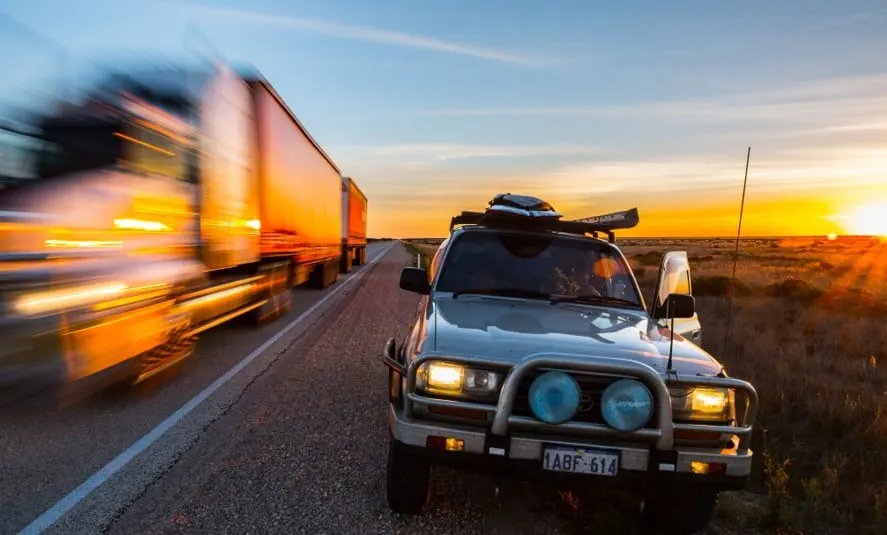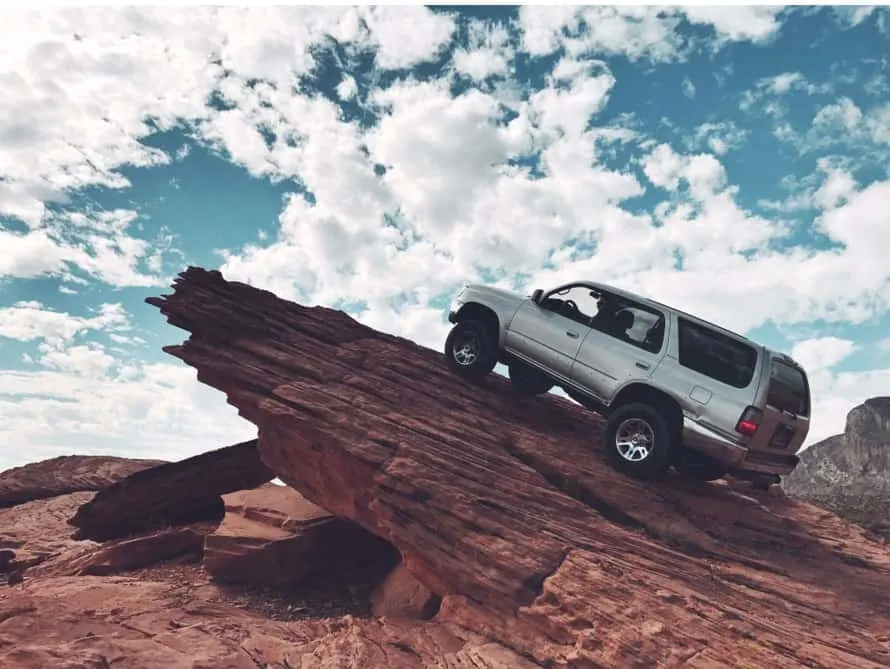One of the major things that keeps on tinkering in most of the minds regarding off-roading is whether this activity is legal or not. If it is illegal, then where should they go to enjoy it legally? To answer this question, we bring extensive information based on laws, regulations, and recommendations provided by the local administrations. Let’s find out: Is off-roading legal?
Generally speaking, off-roading is legal. However you need to follow some regulations in regards with your vehicle’s compliance and the type of terrain that will be tackled during the off-road trip. State specific gov’t rules can be checked through a local administrative office before you kick off.
Also, we have sorted out how you can find places that are legal and where you can take your off-road vehicle for a journey. In the given sections, you will be equipped with every piece of information regarding the legality of off-roading and vehicle.
So before we move further, we bring your attention to a survey conducted in the U.S.A for 5-years regarding the popularity of this motorsport. The results were remarkable because more than 4 million people were directly involved in this activity in just the United States. Furthermore, the numbers have been increasing with every passing year.
Is Off-Roading Legal?
Off-roading is not illegal, and it is booming in major countries of the world. However, there has been a lot of fuss in many states regarding the legality of off-roading.
So, for that, we have listed the given sections with information that will help you understand the legality of off-roading. And, it will also equip you with the prerequisite for making this activity legal in any country.
Understanding Off-Roading Legality:

Being said that ‘off-roading is not an illegal activity’ does not end the story. Off-roading requires in-depth research for its practice, and you may need to know several things like the local laws for driving, vehicle compliance, and above all, the track you have chosen for off-roading before you set your course.
In this case, we bring a complete manual that will help you address off-roading legality and provide you with areas to look for while going off-roading.
1. Laws of Land:
The first thing for you to check before going off-roading is whether the land is private or government-owned.
In the case of private property, you can contact the owner and ask permission for off-roading. In contrast, in the government's case, you can contact the local administrative unit to check out the permissibility of off-roading.
Otherwise, if you go without checking laws – in case of government property – or without permission in privately owned land, you may get arrested or fined.
2. Laws of Driving:
The next aspect that you must consider is the rules and regulations of driving. You must adhere to all the guidelines that the local authorities have mentioned. Particularly, in off-roading, many authorities consider it to be a dangerous form of driving. So you need to check that as well.
In dangerous driving, you also need to consult authorities or the local off-roading community to understand what is considered dangerous and what is not. Contrarily, you will find yourself in jail.
3. Laws Regarding Protective Gear:
After that you have checked out the laws regarding driving and land for off-roading; the next aspect is checking out the compulsory protective gear the authorities have made.
It is important to note because off-roading is an extreme activity, and accounting, these authorities have made certain protective gears compulsory for your safety. So you must put on the compulsory protective Gear which the particular laws state.
What to Wear During ATV Riding?
4. Laws w.r.t Each Area:
Lastly, you need to understand that off-roading changes in every area as the terrain of off-roading laws change as well. So you cannot be sure about off-roading in a particular area without having confirmed it from the authorities.
Likewise, the laws and regulations may also vary in extent in different areas. For example, in one area, trespassing or going out-of-bound may result in a fine, while in some other areas, it may lead you to jail with a heavy fine.
So you must understand there are no constants in off-roading, and you need to do the homework every time you are trekking a new terrain.
Finding Out Legal Off-Road Terrains:
After you understand with the laws, the next aspect is finding out the right places for off-roading in a particular area. However, in most states, the local authorities have mentioned areas for off-roading, and some even have special parks for off-roading.
But, if you want to try some new areas or have found a unique place for off-roading, you have to check out its legality. For this, we have listed some ways that will help you in finding legal areas of off-roading.
Famous Legal Off-Road Trails:
- 15 Best Off-Road Trails Near Atlanta
- Top 20 Off-Road Trails Near Arizona
- Top 20 Off-Road Trails in Bay Area
- 20 Best 4×4 Off-Road Trails in Ohio
- Top 15 Off-Road Trails and Parks in Texas
- 25 Best Dirt Bike Trails in Florida
- 20 Best ATV Trails in Maine
- 12 Best Dirt Bike Trails in PA- Pennsylvania
- 30 Best ATV Trails in Texas
- 20 Best ATV Trails in N.C: North Carolina
- 25 Best Off-Road Trails in Las Vegas
Asking from the Local Community:
One of the unique things about off-roading is, unlike other motorsports, it develops its community easily and in no time. Some people are participating in it at any place, and then others enjoy being around 4*4 pickups moving over rocks. This results in joint development, and it is going to help you a lot.
As you will be new to many places and unknown to many facts, you can contact the local communities regarding terrain, laws, and other matters of off-roading.
People will tell you about other off-roaders as well, and they will let you know which places are legal and how you should be approaching them.
In addition, they will also provide some valuable pieces of advice and tips which are tailored for the specific terrain.
Checking Local Organizations:
Local off-roading can be a source of information as well. Many off-roading organizations are working locally to facilitate other off-roaders, and usually, they are set up around popular off-roading terrains. So if you can contact any of these organizations, your course will be a lot easier and more enjoyable.
That is because these organizations are run by expert off-road drivers, and they are experienced on the terrains that you have chosen to trek.
You can find these organizations from google or their social media pages. Also, you can contact the local municipality; they will help you contact an off-road organization working in their area.
Planning for Off-Roading:

As you have gathered all the information about the terrain from a local community or an off-road organization, the next step is to plan your journey and prepare each aspect of it carefully.
This may include consulting maps, bringing tools, and setting up your car. Also, you need to have a sound communication system and a G.P.S in place. So that you can navigate easily, and in case of emergency, you can communicate to an emergency responder for help. You can also buy a radio-som set for this.
Check Your Vehicle for Compliance:
While planning for the journey, the most important aspect of it is the vehicle. Whether your vehicle is right for the journey or not. In this case, usually, the people opt for ATVs – All Terrain Vehicles, but if you are not going with this option and opting for your regular vehicle for off-roading.
You need to ensure that the vehicle must have some suitable off-road modifications installed to sustain the rugged path. Otherwise, your vehicle will not stand the trek.
That being said, you also need to check the laws regarding vehicle compliance. Every state has formulated its laws for vehicle safety for normal drive and off-roading as well.
Tires, suspension, ground clearance, or power transmission every car needs to have each component’s grades that match what the law states.
In case if any of the components of your car fall below the threshold, like the tires have less diameter or the size of the rim is small for off-roading, you may face a fine over this, or the authorities can seize your vehicle as well creating a huge problem for you. So to avoid this, you need to find out whether the vehicle you are taking matches the requirement or not.
In the same way, there are some recommendations that the authorities have listed for vehicles, including the off-roading as well. These recommendations usually follow a particular terrain like 4WD is more suitable for a particular rock climb or a snorkel is more suitable for crossing a low-water pond.
These recommendations are not essentials, but you will be better off if you take them into account. Furthermore, if you are a newbie, you must consider these recommendations as new, and you may get stuck somewhere. Now, if you have followed the recommendations or your car is compliant with the add-on, it will be much easier for you to get out of there.
In the given table, I have listed some common instruments used in off-roading and the standards that have to be met. Additionally, we have also listed the compliance – how many vehicles are following it to make your decision based on the evidence from other drivers.
Instruments | Standards | Compliance Ratio | Results |
For 40 mm Rim | Exact 40*40 mm tire with durable rubber | 100% | Ensures Vehicle balance |
For 13 inch Suspension | Exact 13 inch without compression and 9inch with compression | Upto 80% | Ensure Smooth Vehicle drive |
Power Transmission | CVT is ideal | Vary with vehicle type and choice | Ensure movement |
Ground Clearance for Rocks | 10.8 inches at least | 100% | Ensure smooth movement on rocks |
Eligibility Criteria for Vehicle Compliance:

As discussed above, the details of vehicle compliance and recommendations now move towards the criteria you must ensure to get your off-road vehicle off-road legal.
1-Standards for Off-Road Vehicles:
- Off-road vehicles must have at least one working light on the front and back and a red brake light.
- Off-road vehicles must be equipped with at least one roadside mirror mounted to the left of the vehicle.
- Off-road vehicles, if manufactured with turn signals, then turn signals must remain operational during the drive.
- Off-road vehicles must not make any unusual noise during their drive.
- Off-road vehicles must be equipped with an exhaust that complies with specifications listed by the manufacturer.
2-Requirements for Off-Road Legality:
- Off-road vehicles must be registered each year.
- Off-road vehicles must have active insurance.
- Off-road vehicles must have a safety certificate.
- Off-road vehicles must-have trail passes made visible on the windscreen.
3- Age Requirements:
All personal operating off-road vehicles must have an active driving license, and those who are under age 16 must pass a safety training course for off-roading. Additionally, under 16 cannot drive vehicles exceeding 90cc.
- Under 11 years are allowed to operate only 70cc ATV.
- Under 16 but above 13 years are allowed to operate ATVs of 90cc with safety training certificates.
What Size ATV Do I Need to Buy for Off-Roading?
Off-Road Tools:
After making your car compliant with rules and regulations, you need to prepare yourself for off-roading as well. Preparation means gathering all the tools and appliances that will be used throughout the journey by you and your car both. The tools include communication, safety, backup instruments, and food supplies.
These tools are also important because in case you had an emergency or a regular inspection by authorities, these tools will save you from injury and fine, respectively.
The specific details of the equipment include:
Safety Tools:
The safety tools usually include a separate winch, a jack, and some pulley and tow straps to help you get out safely. A spare tire and high-intensity torch tire also come in safety tools, and you should bring them also.
Communication Tools:
For communication, you must have a satellite phone (if you are going far away) and a radio set placed and functional in your and your buddy’s vehicle to ease inter-vehicle communication. Along with these, you must bring some additional batteries to keep these sets running for a longer period.
Top 10 Best Radio for Off-Roading
Backup Tools:
For backup, you should bring a jump-starter and air compressor with you. If your vehicle battery gets dead, or your tires get punctured, both of these tools can bring you back on the path.
Extra Food Supplies:
Extra food supplies are a must in off-roading because you never know how much time your journey will take. If your plan is a four-day stay, always take seven days of food, which is the general rule in off-roading.
A Tip for your Safe Journey:
Lastly, if you are going off-roading, you should bring a buddy with you as well. The buddy will help you navigate and also help in making legal and right decisions. You can always talk or consult with another person for every move you make.
Also Read:
Can You Drive Off-Road Without a License? Know in Detail
What to Know Before Going Off-Roading? Tips from the Expert
How Many People Have Died from Off-Roading? Risk and Analysis
Frequently Asked Questions (FAQs):
Can I drive Off-road anywhere?
No, you cannot drive off-road anywhere. If you own private property, you can drive off-road in it. But in the case of public property, there are certain areas where the government has allowed you to drive off-road, and only there you can drive. Otherwise, you are going to face fine.
Is Green Laning legal?
Green cleaning is legal and it is considered as the same public road – although it is without tarmac. But, you can drive on it.
Where can you go off-roading in the U.K?
In the U.K, off-roading can be done in several beautiful places that include Whiteclif, Perthshire, and Silverstone off-road tracks. All these tracks are designated for off-roading, and they are made on breathtaking landscapes.
Is off-roading illegal in the UK?
The law in the U.K states that off-roading is illegal in all the public places that are owned by local councils including car parks, parks, and beaches. Other than this, off-roading is allowed on private property with the consent of the owner.

This is Surya. I am an experienced off-roader. I have been off-roading for many years across several terrains. I am passionate about 4×4 driving and want to share my knowledge and experience with others.
My goal is to provide you with the most comprehensive and unbiased information about off-roading.
I curated this article through my personal experience and expertise, and I hope it helps you with what you are looking for.

 (+91)9123743026
(+91)9123743026
 24/1 Nibedita Sarani. M.B. Road, Kolkata- 700051, India
24/1 Nibedita Sarani. M.B. Road, Kolkata- 700051, India
How to Register an Off-Road Vehicle? The Complete Guide – Offroadhandbook
Wednesday 15th of December 2021
[…] Is Off-Road Driving Legal? […]
What Type of Suspension is Best for Off-Roading? Top 10 Brands – Offroadhandbook
Sunday 18th of July 2021
[…] Is Off-Road Driving Legal? Know the Vehicle ComplianceIs Off-Roading Fun? Everything You Need to Know […]
Is Off-Roading Bad for The Environment? Impact and Mitigation – Offroadhandbook
Sunday 18th of July 2021
[…] Is Off-Road Driving Legal? Know the Vehicle ComplianceHow Many People Have Died from Off-Roading? Risk and Analysis […]